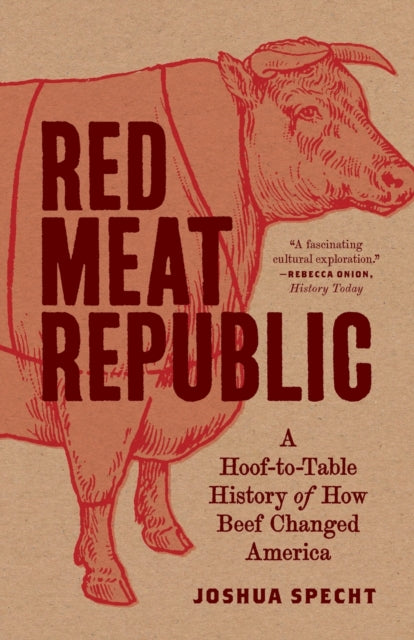Joshua Specht
Red Meat Republic: A Hoof-to-Table History of How Beef Changed America
Red Meat Republic: A Hoof-to-Table History of How Beef Changed America
YOU SAVE £3.05
- Condition: Brand new
- UK Delivery times: Usually arrives within 2 - 3 working days
- UK Shipping: Fee starts at £2.39. Subject to product weight & dimension
Bulk ordering. Want 15 or more copies? Get a personalised quote and bigger discounts. Learn more about bulk orders.
Couldn't load pickup availability
- More about Red Meat Republic: A Hoof-to-Table History of How Beef Changed America
Beef production in the United States had gone from small-scale, localized operations to a highly centralized industry, leading to a violent conflict over who would reap the benefits and who would bear the costs. Joshua Specht's book "Red Meat Republic" reveals the complex history of exploitation and innovation behind the food we consume today.
Format: Paperback / softback
Length: 368 pages
Publication date: 06 October 2020
Publisher: Princeton University Press
By the late 19th century, both the rich and poor in America had come to expect high-quality, fresh beef with almost every meal. Beef production in the United States had undergone a remarkable transformation, transitioning from small-scale, localized operations to a highly centralized industry that spanned the entire country. This book delves into the captivating story of the intense conflict that unfolded over who would reap the benefits of this new industry and who would shoulder its significant costs. Joshua Specht vividly brings to life a turbulent era characterized by Indian wars, Chicago labor unrest, and food riots in the streets of New York. Red Meat Republic is a compelling and thoroughly enjoyable read that uncovers the intricate history of exploitation and innovation behind the food we consume today.
The expansion of beef production in the United States during the late 19th century was a significant milestone in the country's agricultural history. Prior to this period, beef was primarily produced on small farms and consumed locally. However, with the advent of new technologies, such as the railroad and refrigeration, beef could be transported across long distances and stored for extended periods of time. This led to the establishment of large-scale beef ranches, which were capable of producing vast quantities of beef at a lower cost than small-scale farms.
One of the key factors that contributed to the growth of the beef industry was the demand for meat among the growing population of the United States. As the country expanded westward, new settlements and cities were built, and there was a growing demand for affordable and high-quality meat. The beef industry responded to this demand by expanding its operations and increasing the number of cattle being raised.
Another factor that contributed to the growth of the beef industry was the development of new technologies and practices in animal husbandry. In the early 1900s, scientists and farmers began to experiment with new breeding techniques and feeding programs that aimed to improve the quality and yield of beef cattle. These innovations led to the development of hybrid breeds of cattle, such as the Angus and Hereford, which were more efficient and productive than traditional breeds.
The expansion of the beef industry also had significant economic implications for the United States. Beef production was a major source of employment and income for many rural communities, particularly in the western states. The industry also generated significant revenue for the government through taxes and tariffs on beef exports.
However, the growth of the beef industry also had negative consequences for the environment and animal welfare. Large-scale beef ranches require vast amounts of land and water to operate, and they contribute to deforestation, soil erosion, and water pollution. The practices used in animal husbandry, such as confinement and feedlotting, can also be harmful to the health and well-being of cattle.
Despite these challenges, the beef industry continued to grow and evolve in the 20th century. New technologies and practices were developed to improve the efficiency and sustainability of beef production, and the industry began to focus on promoting sustainable and ethical farming practices.
In conclusion, the expansion of beef production in the United States during the late 19th century was a significant milestone in the country's agricultural history. The industry's growth was driven by the demand for meat among the growing population, the development of new technologies and practices in animal husbandry, and the economic implications of the industry. While the beef industry has faced challenges and criticisms, it has also made significant progress in improving its sustainability and ethical practices.
Weight: 374g
Dimension: 142 x 216 x 32 (mm)
ISBN-13: 9780691209180
This item can be found in:
UK and International shipping information
UK and International shipping information
UK Delivery and returns information:
- Delivery within 2 - 3 days when ordering in the UK.
- Shipping fee for UK customers from £2.39. Fully tracked shipping service available.
- Returns policy: Return within 30 days of receipt for full refund.
International deliveries:
Shulph Ink now ships to Australia, Belgium, Canada, France, Germany, Ireland, Italy, India, Luxembourg Saudi Arabia, Singapore, Spain, Netherlands, New Zealand, United Arab Emirates, United States of America.
- Delivery times: within 5 - 10 days for international orders.
- Shipping fee: charges vary for overseas orders. Only tracked services are available for most international orders. Some countries have untracked shipping options.
- Customs charges: If ordering to addresses outside the United Kingdom, you may or may not incur additional customs and duties fees during local delivery.


